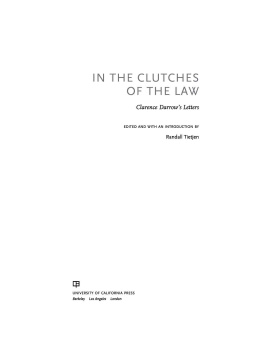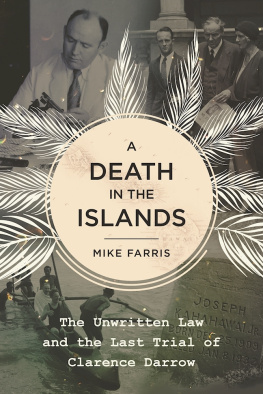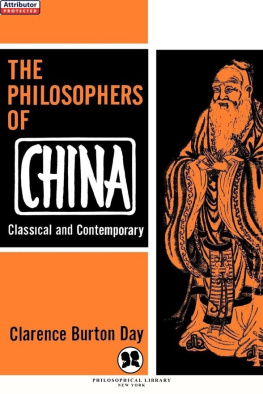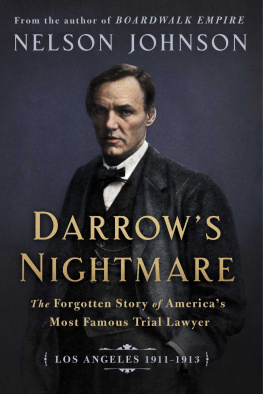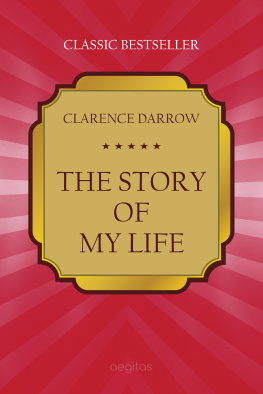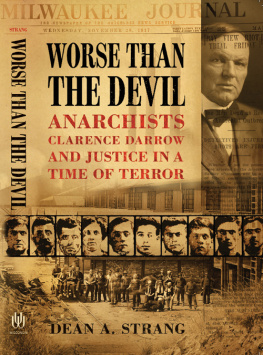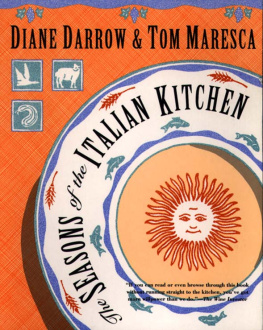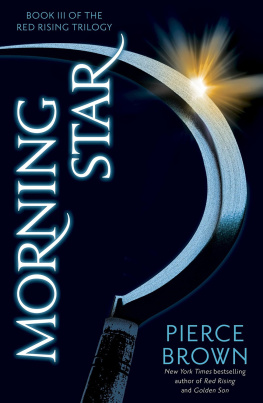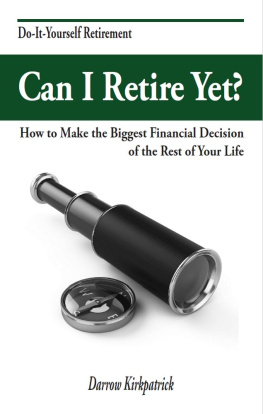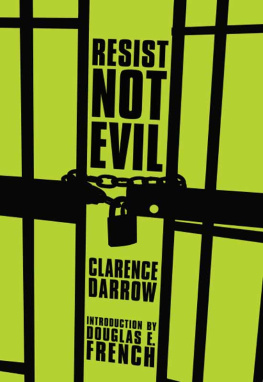Darrow Clarence - In the Clutches of the Law
Here you can read online Darrow Clarence - In the Clutches of the Law full text of the book (entire story) in english for free. Download pdf and epub, get meaning, cover and reviews about this ebook. year: 2013, publisher: University of California Press, genre: Detective and thriller. Description of the work, (preface) as well as reviews are available. Best literature library LitArk.com created for fans of good reading and offers a wide selection of genres:
Romance novel
Science fiction
Adventure
Detective
Science
History
Home and family
Prose
Art
Politics
Computer
Non-fiction
Religion
Business
Children
Humor
Choose a favorite category and find really read worthwhile books. Enjoy immersion in the world of imagination, feel the emotions of the characters or learn something new for yourself, make an fascinating discovery.
- Book:In the Clutches of the Law
- Author:
- Publisher:University of California Press
- Genre:
- Year:2013
- Rating:4 / 5
- Favourites:Add to favourites
- Your mark:
- 80
- 1
- 2
- 3
- 4
- 5
In the Clutches of the Law: summary, description and annotation
We offer to read an annotation, description, summary or preface (depends on what the author of the book "In the Clutches of the Law" wrote himself). If you haven't found the necessary information about the book — write in the comments, we will try to find it.
In the Clutches of the Law — read online for free the complete book (whole text) full work
Below is the text of the book, divided by pages. System saving the place of the last page read, allows you to conveniently read the book "In the Clutches of the Law" online for free, without having to search again every time where you left off. Put a bookmark, and you can go to the page where you finished reading at any time.
Font size:
Interval:
Bookmark:

IN THE CLUTCHES OF THE LAW
IN THE CLUTCHES
OF THE LAW
Clarence Darrows Letters
EDITED AND WITH AN INTRODUCTION BY
Randall Tietjen

UNIVERSITY OF CALIFORNIA PRESS
BerkeleyLos AngelesLondon
University of California Press, one of the most distinguished university presses in the United States, enriches lives around the world by advancing scholarship in the humanities, social sciences, and natural sciences. Its activities are supported by the UC Press Foundation and by philanthropic contributions from individuals and institutions. For more information, visit www.ucpress.edu.
University of California Press
Berkeley and Los Angeles, California
University of California Press, Ltd.
London, England
2013 by Randall Tietjen
Library of Congress Cataloging-in-Publication Data
Darrow, Clarence, 18571938.
[Correspondence]
In the clutches of the law : Clarence Darrows letters / Edited and with an introduction by Randall Tietjen.
p. cm.
Includes bibliographical references and index.
ISBN 978-0-520-26558-5 (cloth : alk. paper)
eISBN 9780520954588
1. Darrow, Clarence, 18571938Correspondence. 2. LawyersUnited StatesCorrespondence. I. Tietjen, Randall (Matthew), 1961 editor of compilation. II. Title.
KF373.D35A4 2013
340.092dc23
[B]2012045889
Manufactured in the United States of America
22 21 20 19 18 17 16 15 14 13
10 9 8 7 6 5 4 3 2 1
The paper used in this publication meets the minimum requirements of ANSI/NISO Z 39.48-1992 ( R 2002) ( Permanence of Paper ).
For Susan
and our children,
Benjamin and Sophia
CONTENTS
ILLUSTRATIONS
PREFACE
MY SEARCH FOR LETTERS
My interest in Darrow began in 1991 when I was living in Lincoln, Nebraska. I had recently finished law school in Minnesota and was working as a law clerk for a judge. I knew almost no one in Lincoln and had some free time in the evenings and on weekends. I thought about writing an article or possibly a book and then saw an advertisement for the letters of Eugene Debs, which had just recently been published by the University of Illinois Press. I knew that Debs had been one of Darrows more famous clients and it occurred to me that Darrows letters had never been published.
I did not know much about Darrow other than what I had read in a few books about him. I knew that most of his fame as a lawyer springs from two cases: the Leopold and Loeb case in 1924 and the Scopes trial in 1925. From what I had read of Darrows writings, I also knew that he had been a fine writer and speaker. So I started writing to libraries around the country, asking them to look in certain manuscript collections for his letters. Before long, I was receiving photocopies of his letters from the libraries and realized that what I had thought of Darrow as a writer was proving true. His lettersat least some of themwere beautifully written and interesting to read. I forwarded copies of the letters to Darrows two surviving grandchildrenMary Darrow Simonson and Blanche Darrow Chasedaughters of Darrows only child, Paul Darrow, and his wife, Lillian. (Pauls other child, his oldest daughter, Jessie, died in 1968, and Mary and Blanche have also since died.) Mary and Blancheboth of whom were very supportive of my efforts to unearth their grandfathers letterswere in their twenties when Darrow died in 1938, and they lived just one block from him in the Hyde Park area of Chicago.
Several months after I started looking for Darrows letters, I drove to Chicago to meet Blanche (Mary lived in Hawaii). Blanche lived in a suburb of the city with her husband, Gordon. The day before I arrived, Gordon had been down in their basement looking through some old boxes. When I arrived, they told me that Gordon had found a box filled with some old papers and they were wondering if I would like to look at the contents. I was excited, of course, but had no idea what was about to come up from the basement. Gordon brought out a box stuffedthere was no order or neatness to itwith 110 or so letters written to Darrow by some of the most famous Americans of the early twentieth century. Inside the box were letters from well-known writers, politicians, labor leaders, and other public figures, including William Dean Howells, Jane Addams, Woodrow Wilson, H.L. Mencken, Henry Ford, Helen Keller, William Jennings Bryan, William Randolph Hearst, Frank Lloyd Wright, W.E.B. Du Bois, John Mitchell, Upton Sinclair, Mother Jones, Eugene Debs, Franklin Roosevelt, F.H. La Guardia, Theodore Dreiser, and Sinclair Lewis.
Also in the box were letters and postcards from lesser-known people, including Robert LaFollette, George Jean Nathan, Arthur Brisbane, Charles Chesnutt, Richard Bennett, William Pinkerton, Anita Loos, Theodore Powys, Zona Gale, Will Durant, Brand Whitlock, Elbert Hubbard, Hamlin Garland, William Allen White, Hutchins Hapgood, Bolton Hall, Fred Gardner, John T. McCutcheon, Algernon Crapsey, Horace J. Bridges, Oscar DePriest, Carl Laemmle, and Harry Elmer Barnes. The letters spanned a thirty-eight-year period, from 1896 (a letter from William Dean Howells) to 1933 (a letter from La Guardia). This was not a random sample of Darrows mail; someone had selected and saved these letters because of the authors. Blanche told me that she thought her father might have picked them out over the years, as souvenirs, from the piles of letters in the room that Darrow used as an office in his apartment. This is consistent with what Darrows second wife, Ruby Darrow, told a friend in Los Angeles who was collecting letters and hoping to find some from famous people in Darrows hands: One reason for scarcity at close range, is:Paul Darrow(son of CD) always appropriated, and still does, all that happen along, if noticed,and if I have remembered to call attention to them...
After Blanche and Gordon and I had gone through all of these letters in their living room, Gordon and I (Blanche had a problem hip and did not want to walk the stairs) went into a large storage area in a corner of their basement to search for more treasure. This was an area of the basement with shelves stacked high with boxes. We spent quite a while searching for more material, and what we found, by the end of our search, was just as exciting as what we had seen so far. In unmarked boxes and a box labeled Christmas ornaments we found hundreds of letters to and from Darrow and other members of his family. These included approximately 330 letters written by Darrow to his first wife, Jessie, and to their son, Paul. The boxes also contained many other family letters, including approximately forty letters by Darrows oldest brother, Everettmost of them written to Darrow from Paris, when Darrow was facing trial for jury bribery in 191113 in Los Angeles; letters written by several of Darrows other siblings, including his two sisters, Jennie and Mary, and two of his other brothers, Hubert and Channing; letters written by his son, Paul; many letters written by Darrows second wife, Ruby; a few letters and transcripts of letters written by Darrows mother, Emily, who died when Darrow was fifteen, and by Darrows father, Ammirus.
We found scrapbooks of newspaper clippings that Darrows first wife, Jessie, had kept of her husbands career, including many of his early writings published in newspapers as well as news items about speeches and activities that had long been lost or forgotten. We also found nineteen letters written by Darrows brother-in-law, J. Howard Moore (he was married to Darrows sister Jennie). These were written to Henry Salt, the English writer and humanitarian reformer. Moore, who lived in Chicago, was a leading advocate of vegetarianism and animal rights. In addition to all of these letters, the boxes also contained many reprints of Darrows published articles and pamphlets containing his speeches, jury summations, and debates (almost all of these were already generally available in one form or another through libraries).
Next pageFont size:
Interval:
Bookmark:
Similar books «In the Clutches of the Law»
Look at similar books to In the Clutches of the Law. We have selected literature similar in name and meaning in the hope of providing readers with more options to find new, interesting, not yet read works.
Discussion, reviews of the book In the Clutches of the Law and just readers' own opinions. Leave your comments, write what you think about the work, its meaning or the main characters. Specify what exactly you liked and what you didn't like, and why you think so.

